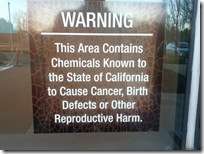Heather Peters has become semi-famous this week because of her small-claims suit against Honda. Honda reached a class-action settlement because the gas mileage of the Civic is simply not up to par. This matches my own experience. Aside from the first few months owning the car where I was both actively hypermiling and also driving exclusively highway miles, the gas mileage in my car has been disappointing. My hybrid gets ~38mpg right now, a far cry worse than the claimed 50mpg that I should be getting.
The class action lawsuit was a joke. The lawyers walked away with millions, while the consumers were compensated with $100 and a video. And each Civic Hybrid consumer has thousands of dollars in damages. Worse, the settlement bars anyone who even complained about the settlement from receiving the settlement. I complained, of course, and my punishment is that I didn’t get the $100.
Since there seems to be renewed interest in this whole affair, here is the full text of the letter I submitted to the court regarding the class action suit back in December 2009.
UNITED STATES DISTRICT COURT
CENTRAL DISTRICT OF CALIFORNIA
EASTERN DISTRICT – RIVERSIDE
JOHN TRUE, et al.,
Plaintiffs, Case No.: 5:07-cv-00287-VAP-OP
v.
AMERICAN HONDA MOTOR CO., INC
Defendants.
OBJECTIONS TO CLASS ACTION SETTLEMENT
I am a member of the settlement class for Case No. 5:07-cv-00287-VAP-OP (True vs. Honda Motor Company Inc.). This letter officially declares my objection to the settlement on the grounds that this settlement is not in the best interest of the members of the settlement class.
Background
This lawsuit was brought against American Honda Motors (AMH) because the fuel efficiency of their cars does not match the advertised claims. Evidence has been presented that the cars were advertised to achieve 50MPG while only actually achieving 32MPG for many drivers. Drivers of these cars often purchase them specifically because of the alleged low cost of operation. When the gas mileage fails to achieve advertised claims, the consumer is left to pay the difference. I believe the difference is an accurate representation of the damages caused by AMH.
The Honda Civic warranties apply to various parts of the car for 50,000 to 150,000 miles, and consumers are sold the car with the expectation that 100,000 miles is reasonable
. Gasoline in California has averaged ~$3.20 per gallon over the last 3 years
. Using these figures, if the car only achieved 32MPG instead of 50MPG, the per-consumer damages are ~$3,600.
Objections
I have 4 objections to this settlement.
Objection #1: Failure to correct damages for the settlement class
Given the magnitude of damages to consumers, the settlement offer simply is not in the best interest of the settlement class. The settlement reimburses the members of the class for less than 2% of the damages incurred.
In the settlement, members are given 3 options:
a) Sell your hybrid, and get a $1000 coupon on another Honda (not a hybrid).
b) Give your hybrid to a family member, get a $500 coupon on another Honda (not a hybrid).
c) Get a $100 check.
All 3 options include a video for how to get better gas mileage.
Even if the settlement member wanted a new car (which many do not), the $1,000 rebate still would still be less than one-third of the damages incurred due to unexpectedly low cost-of-operation.
But worse, for most consumers, the $100 settlement is so small that it does not offset the damages at all. At the same time, this settlement greatly reduces the consumer’s claims against Honda, and may even void the consumers current warranty. Why would any consumer sell this privilege for a mere $100? (see the second objection #2).
Objection #2: Overreaching settlement releases
As part of this settlement, all members of the settlement class release all claims against AMH regarding anything related to the fuel economy of the vehicle. Specifically, the settlement covers anything
“involving, based on, relating to, arising out of or in any way connected with, directly or indirectly, the advertising of the fuel economy or m.p.g. of the HCH…”
With regard to existing warranties, it states
“Nothing in this Agreement shall be interpreted to modify or diminish the manufacturer’s limited warranty with respect to a Class Vehicle; provided, however, that any such claim of breach of any warranty or any extended warranty based on the advertising or representations made by AHM with respect to fuel economy, mileage or m.p.g are in fact released.”
This clause is completely overreaching! For instance, Honda warrants the batteries in the vehicle for 50-150K miles. When I was sold the vehicle, the salesperson told me that the batteries would not need replacement for 150K miles. However, as the batteries get old (much like the batteries in your cellphone), they hold their charge for diminishing amounts of time. The car will still operate just fine even with diminished battery life, but the MPG rating will drop significantly! I fear that if I accept this settlement, and then I go to Honda to get help with replacement of my previously-under-warranty batteries, I will no longer have a claim. Honda will be able to say that my car is working fine, and that the battery problem related to MPG was Released as part of this settlement.
As such, this contract specifically DOES alter my warranty, despite claims to the contrary.
Objection #3: The retaliatory nature of the settlement against its members.
As part of this settlement, any member of the settlement class that objects to the settlement is specifically barred from collecting any benefits if the settlement is accepted by the court. This clause is clearly not in the best interest of the settlement class, and is actually retaliatory in nature.
It is clear to me that the damages I have personally incurred due to AMH’s wrongful advertising are far in excess of the $100 settlement. Purchasing a new Honda has no appeal to me. I do not want to purchase a new car from Honda at any time in the future, and even if I did, I would like to get a hybrid. As such, options (a) and (b) simply do not make any sense.
But the negotiators of this settlement have defined only 3 options, and I am required to either accept them or be ignored from any settlement result. This clearly only serves the interest of the legal staff and does not serve the interest of the plaintiffs.
Objection #4: Negotiation of excessive attorney compensation at the expense of the settlement members
I recognize that the attorneys have worked hard on this case for the last year. While they are pushing for a quick settlement which will enable them to receive a hefty payout of nearly 3 million dollars, they have failed to negotiate a settlement which actually addresses the original problem in the claim. If they believe that settlement members would benefit by accepting a plan which voids their warranty and only recoups 2% of the damages, then the attorney fees should also be diminished – I propose they should be set to 2% of the requested fees, or $92,187.
My Status in the Settlement Class
The following responses are the required responses as per the proposed settlement in progress.
(i) Name address and phone number
Michael Belshe
[DETAILS OMITTED FROM BLOG]
(iii) Grounds for objection
Stated above.
(iv) Proof
Stated above.
(v) No persons will be called to testify
(vi) I do intend to appear at the Final Approval Hearing, schedule permitting.
(vii) I have appeared in no other cases as a settlement objector or counsel in the past 5 years.
Recommendations
I have 5 recommendations for the settlement:
(a) The negotiators should compute a reasonable figure for damages to each consumer. (I computed $3,600).
(b) The negotiators should negotiate a settlement for at least 50% of those damages.
(c) Objecting to a proposal must not cause members to be excluded from a settlement.
(d) The settlement must re-address the warranty voiding effects mentioned above.
(e) The attorney fees should be in-line with what settlement members receive in the settlement. If the settlement members recoup 50% of their damages, then the attorneys should only collect 50% of their $2.95M fee as well.
Respectfully,
Michael A Belshe

